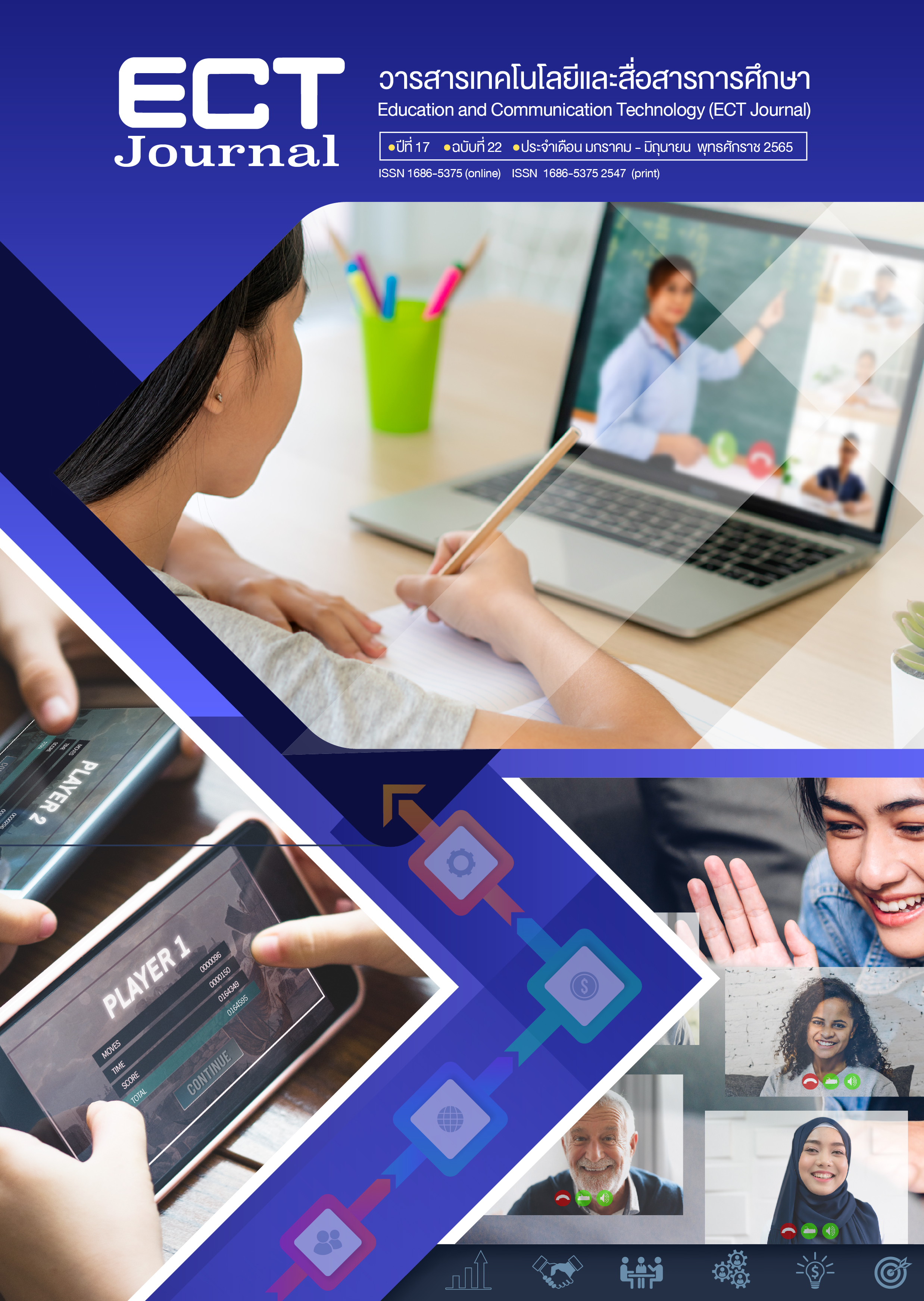Developing Online Learning Community Model for Enhancing Digital and Collaborative Skills of Pre-Service Teachers at Phranakhon Rajabhat University
Keywords:
online learning community model, digital skills, collaborative skillsAbstract
The objectives of this research were to 1) develop online learning community model for enhancing digital and collaboration skills of pre-service teachers at Phranakhon Rajabhat University; 2) compare digital skills before and after learning instructions by implementing an online learning community; and 3) compare digital and collaboration skills between the groups of the online learning community group and the control group. The research instrument was an online learning community model for enhancing digital and collaborative skills. The sample group used in the research was obtained by simple random sampling method by using lucky draw, 2 study groups were drawn forทan experimental group of 33 students and a control group of 23 students. The data were analyzed using mean, standard deviation and t-test.
The results of the research showed that:
1) Online learning community model for enhancing digital and collaborative skills consisted of input factors, learning process, and learning outcomes at the highest suitable level.
2) Digital skills of pre-service teachers after implementing learning instruction using online learning community model was higher than before with statistical significance at the level of .05
3) Digital skills of pre-service teachers after implementing learning instruction using online learning community, the experimental group was higher than the control group with statistical significance at the level of .05
4) For collaborative skills, the experimental group was higher than the control group with statistical significance at the level of .05
References
ใจทิพย์ ณ สงขลา. (2547). การออกแบบการเรียนการสอนบนเว็บในระบบการเรียนอิเล็กทรอนิกส์. ศูนย์เอกสารและตำราคณะครุศาสตร์.
ฐิติยา เนตรวงษ์. (2556). การพัฒนาเหตุผลเชิงจริยธรรมโดยวิธีการเรียนรู้แบบมีส่วนร่วมด้วยเทคนิคกลุ่มสืบสอบและใช้โครงงานคุณธรรมเป็นฐาน. วารสารวิจัย มสด, 9(3), 67-79. https://www.tci-thaijo.org/index.php/sduhs/article/view/18781
ธนชาติ นุ่มนนท์. (2562, 8 มีนาคม). Digital Skill ที่คนไทยควรมีถ้าจะต้องก้าวไปสู่ Thailand 4.0. Thai Tribune. http://www.thaitribune.org/contents/detail/305?content_id=34852&rand=1552027548
ธานินทร์ คงศิลา. (2557). รูปแบบการเรียนรู้โดยใช้ทรัพยากรเป็นฐานเพื่อพัฒนาทักษะการคิดวิเคราะห์เชิงตัวเลข การสื่อสารและการใช้เทคโนโลยีสารสนเทศ สำหรับนิสิตระดับปริญญาตรี [วิทยานิพนธ์ปริญญาดุษฎีบัณฑิต, มหาวิทยาลัยเทคโนโลยีพระจอมเกล้าพระนครเหนือ]. http://repository.kmutnb.ac.th/handle/kmutnb/315
ประเสริฐ ผลิตผลการพิมพ์. (2554). 21st Century Skills Rethinking How Students Learn ทักษะแห่งอนาคตใหม่ การศึกษาเพื่อศตวรรษที่ 21. Open worlds. https://www.se-ed.com/product/21st-Century-Skills.aspx?no=9789740820362
พิชัย ทองดีเลิศ. (2547). การนำเสนอรูปแบบการเรียนรู้ร่วมกันบนเครือข่ายคอมพิวเตอร์สำหรับนิสิตระดับปริญญาตรีที่มีรูปแบบการเรียนต่างกัน [วิทยานิพนธ์ปริญญาดุษฎีบัณฑิต, จุฬาลงกรณ์มหาวิทยาลัย]. https://cuir.car.chula.ac.th/handle/123456789/1161
วิจารณ์ พานิช. (2555). วิถีสร้างการเรียนรู้เพื่อศิษย์ในศตวรรษที่ 21. มูลนิธิสดศรี-สฤษดิ์วงศ์. https://www.scbfoundation.com/publishing/3196/3196
สุวิธิดา จรุงเกียรติกุล. (2561, 1 กุมภาพันธ์). ทักษะการเรียนรู้ในศตวรรษที่ 21 (The Twenty-First Century Skills). TruePlookpanya. https://www.trueplookpanya.com/blog/content/66054/-teaartedu-teaart-teaarttea-
Downloads
Published
How to Cite
Issue
Section
License
Copyright (c) 2022 มหาวิทยาลัยสุโขทัยธรรมาธิราช

This work is licensed under a Creative Commons Attribution-NonCommercial-NoDerivatives 4.0 International License.
1. ทรรศนะและข้อคิดเห็นใด ๆ ที่ปรากฏอยู่ในวารสาร ECT Education and Communication Technology Journal เป็นของผู้เขียนโดยเฉพาะ สำนักเทคโนโลยีการศึกษา มหาวิทยาลัยสุโขทัยธรรมาธิราช และกองบรรณาธิการไม่จำเป็นต้องเห็นพ้องด้วย
2. กองบรรณาธิการของสงวนลิขสิทธิ์ในการบรรณาธิการข้อเขียนทุกชิ้น เพื่อความเหมาะสมในการจัดพิมพ์เผยแพร่






